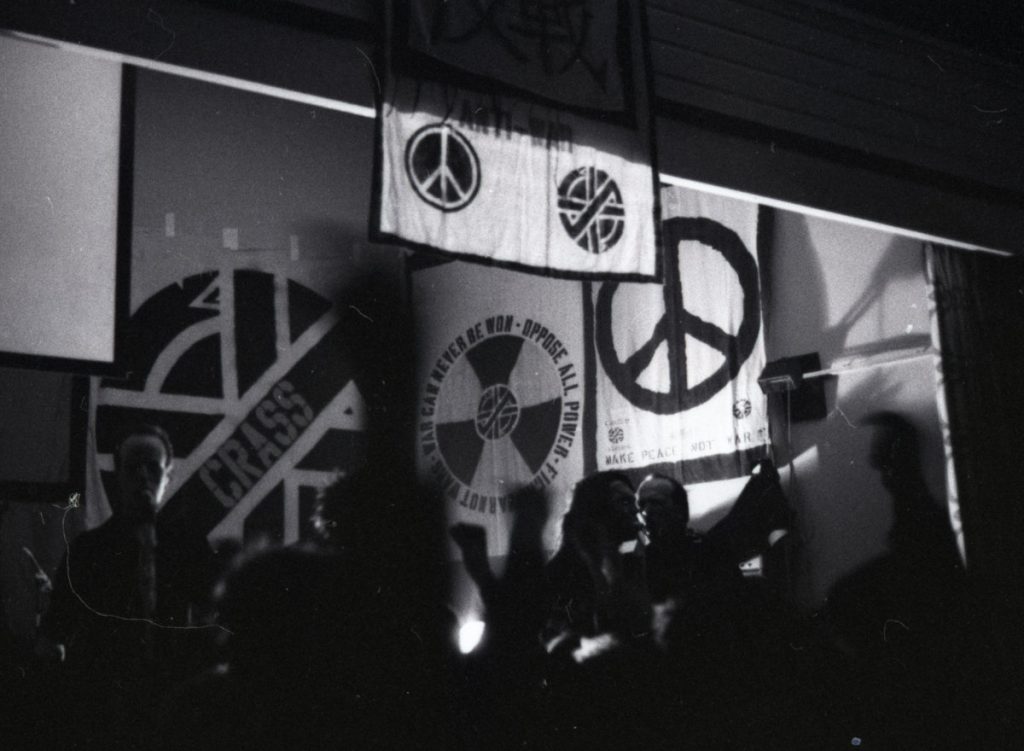Crass emerged from the London punk scene, driven by a desire to provoke thought and inspire action against the political landscape of the late 1970s. With a collective ideology rooted in anarchy, the band was determined to promote ideals that championed personal freedom and questioned authority. The members were not just musicians but activists who aimed to use their art as a means of resistance.
The band’s formation was heavily influenced by the sociopolitical context of the time. The UK was grappling with high unemployment, class struggles, and increasingly draconian governmental measures. In this atmosphere, Crass began to produce music that resonated with a generation dissatisfied with the status quo. Their fusion of punk music with a loud and unapologetic message against war, capitalism, and societal norms was integral in the development of anarcho-punk.
Crass’s debut album, The Feeding of the 5000, released in 1978 on their own label (as all of their releases), is emblematic of their approach. The album features tracks like “Asylum,” “Do They Owe Us A Living?”, and “Punk Is Dead,” which challenge the commodification of punk culture itself. The raw production quality and the urgent vocal delivery, combined with biting lyrics, created an infectious energy that resonated with fans of political music.
Another notable track from their debut was “Banned from the Roxy,” which captures the essence of Crass’ philosophy. This song illustrates the band’s ongoing battle against censorship and authority, echoing struggles faced not only in the music scene but across society as a whole.
Their follow-up album, Stations of the Crass, released in 1979, further solidified their reputation. This sprawling double LP encompasses themes of war, apathy, and the futility of modern society. Songs like “White Punks on Hope” provocatively express the band’s views on racism and fascism. The lyrics also urge listeners to consider their positions concerning authority and governance.
In 1981 they released their third album, Penis Envy which moved into darker territories, addressing themes around gender and sexuality with a fearless lens. Songs like “Bata Motel” tackle misogyny and the pressure for women to conform to oppressive and sexist societal expectations. Vocalist Steve Ignorant took a break on this album, passing the exclusive reins to female vocalists Eve Libertine and Joy De Vivre. This allowed the band to become trailblazers in providing space for feminist themes within punk.
In 1982, they released their fourth album Christ – The Album, which further illustrates their musical evolution. This effort delves into topics surrounding religion, war, and the human condition. This was followed by the 1983 anti-Thatcher Yes Sir, I Will. Their final studio recording was the 1986 avant-garde EP The Swan Song: Ten Notes on a Summer’s Day, which was released after the band disbanded.
The band also relished their role as disruptors and, at times, would create controversy and upheaval through different hoaxes. Their most notable hoax was the Thatchergate tapes, which were released into the public domain in 1983. The band spliced together speeches from the British Prime Minister Margaret Thatcher and US President Ronald Reagan to make it appear they were having a conversation about using Europe as a battle front for the US to show the Soviet Union their resolve in a nuclear conflict. The US initially thought it was Soviet propaganda, and in the UK, MI6 was investigating. In 1984, the UK newspaper The Observer broke the story that the tapes originated from the band.
Crass exemplifies the powerful intersection of music and activism. Their DIY aesthetics and in-your-face politics inspired countless punk acts such as Propagandhi and DIY icon and Discord Records founder Ian MacKaye of Fugazi and Minor Threat. The band was also influential in the way they incorporated multimedia art.
The band’s two female vocalists and their exploration of feminist themes were also important in the development of the Riot Grrrl movement. Another artist influenced by Crass is singer-songwriter Sunny War, who blends anarcho-punk elements with roots music. Crass vocalist Steve Ignorant is featured on her 2025 tune “Walking Contradiction.”
Crass remains a pioneering force in the development of protest music, showcasing the vital role that art can play in challenging and transforming society.


